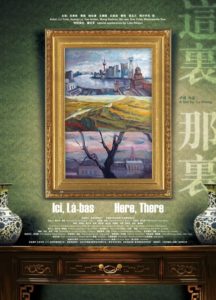Here There
这里 那里
China, 2011, colour, 16:9, 91 mins.
Director: Lu Sheng 卢晟.
Rating: 3/10.
Collage of three thin, weakly-developed stories is neither here nor there.
The present day. In a tundra-like forest in Inner Mongolia during winter, an Ewenki-minority herdsman (Bao Yanbo) collects two stray reindeer and is later joined in his mountainside lodging by his wife (Su Yulan) and young son (Weierqiaoke Suo). The herdsman’s younger brother, Guoguang (Lv Yulai), works in a small, beef noodle soup restaurant in Shanghai, run by a widower, Lu (Yao Anlian), whose son, Lu Hao (Qin Wei), is studying photography in Paris. Yang Xia (Huang Lu), a Sichuanese girl whom Guoguang used to know, and who is now selling insurance, comes by the restaurant and they resume their friendship. In Paris, Lu Hao has his money and passport stolen, and has to work in a restaurant to make ends meet. His aged landlord, Liu (Wang Deshun), who’s been in France for 60 years, helps him get a forged passport, and the two of them take a journey to the graves of Liu’s old war comrades.
REVIEW
In his directing debut, French-trained d.p. Lu Sheng 卢晟 (The Park 公园, 2007; The Ditch 夹边沟, 2010; City Monkey 玩酷青春, 2010) goes all arty to no discernible effect in Here There 这里 那里, a three-stranded film that wanders hither and thither in search of a common thread and something to say. During the past six years, Shanghai-born Lu has worked with a variety of directors, from arty to commercial; for his own movie he adopts a fairly neutral, unvarnished style, shooting on three very different locations (Inner Mongolia in winter, the streets of Paris, a small restaurant in Shanghai) with no special look. Unsurprisingly, the stunning, tundra-like forests of northern China pack the biggest visual punch, whereas Shanghai emerges as particularly flavourless.
“Flavourless” could also describe the whole film, which drops in on its geographically dispersed characters in a random way without ever developing them beyond a superficial level. In the Shanghai story, a girl appears from a young waiter’s past and their on-off relationship then abruptly ends; in the Inner Mongolian sections, a herdsman is temporarily united with his family but to no dramatic effect; and in the Paris strand, the main character is a blank observer of more interesting people than himself. Though the spectre of death (widowhood, suicide, graveyards) hangs heavy over the various stories, Lu and his two co-writers seem unable to forge anything compelling from their scattered material.
Performances are so-so, apart from always reliable TV actor Yao Anlian 姚安濂 (Shanghai Dreams 青红, 2005; The Red Awn 红色康拜因, 2007) as the sick restaurateur who puts a brave face on his son being overseas, and veteran theatre actor Wang Deshun 王德顺 (What Women Want 我知女人心, 2011) as an old overseas Chinese in Paris. As the girl from the young waiter’s past, Huang Lu 黄璐 (Blind Mountain 盲山, 2007; The Red Awn) is lively in a foggily drawn part.
CREDITS
Presented by Nanjing Film Studio (CN), Beijing Xingguang Hengyi Culture (CN). Produced by Beijing Xingguang Hengyi Culture (CN).
Script: Liu Yong, Xu Yang, Lu Sheng. Photography: Lu Sheng. Editing: Kong Jinlei. Music: Mun Yeong-min. Art direction: Liu Qiang. Costumes: Lian Lian. Sound: Zhang Yang. Visual effects: Yang Fuding (Beijing Wonderstar VFX).
Cast: Lv Yulai (Guoguang), Huang Lu (Yang Xia), Yao Anlian (Lu Hao’s father), Wang Deshun (Liu, uncle), Qin Wei (Lu Hao), Bai Yanbo (herdsman), Su Yulan (herdsman’s wife), Weierqiaoke Suo (Wilczok, herdsman’s son), Fang Jun (Zhao, cook), Pan Hanyong (head cook), Jacques Lin (Li, tattooist).
Premiere: Vancouver Film Festival (Dragons and Tigers Competition), 3 Oct 2011.
Release: China, 2 Dec 2011.
(Review originally published on Film Business Asia, 29 Jun 2012.)
